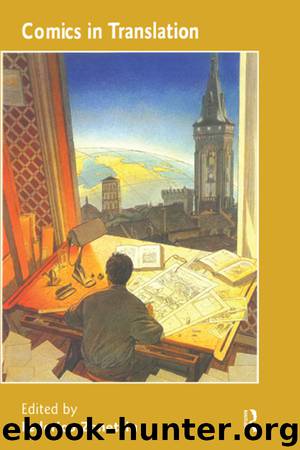Comics in Translation by Zanettin Federico

Author:Zanettin, Federico
Language: eng
Format: epub
ISBN: 9781317639909
Publisher: Taylor & Francis (CAM)
3.2
Do the FTA on Record with Mitigation
The second main strategy used in the Gulf area and Egypt is ‘do the FTA on record with mitigation’. According to Brown and Levinson (1987:73), the use of this strategy affords the speaker the opportunity to “placate” the hearer; “to counteract the potential face damage of the FTA by doing it in such a way, or with such modifications or additions to indicate clearly that no such face threat is intended or desired” (1987:69-70; emphasis added). Thus, depending on which aspect of face (positive or negative) is being attended to, this strategy takes one of two forms: positive politeness, which is redress directed at the hearer’s positive face – the positive self-image s/he claims for himself/herself, and negative politeness, which is redressive action addressed to the hearer’s negative face – his/her basic want to have his/her freedom of action unimpeded.
When this strategy is applied in the Gulf area and Egypt, one main subcategory emerges, revealing a new dimension to the strategy’s function and applicability to written texts such as Disney comics translated into Arabic. This mechanism or redressive action is ‘the use of euphemism’.
In addition to deleting any romantic and sexual references (realizing the ‘don’t do the FTA’ strategy), Speaker2 in the Gulf area uses euphemistic expressions to translate terms considered inappropriate for an Arab reader. For example, in one panel of “aṣdiqā” (‘Friends’), a Kuwaiti story published in Battut in 2000, Donald is in a daze as he speaks ḥāliman ṭuwāl-l-waqti wa mushattatu-dhdhihni wa ka’annaka fī ḥālati ḥub!” (“A special sickness that makes you dream all the time and makes you feel as if you’re in love!”). The panel shows the Publication Director’s instruction to change the word “ḥub” (“love”) into “tawaddud” (“liking”). Similarly, the Publication Director also requested that the word “ḥub” (“love”) be changed into “dhālika-shshay’” (“that thing”) in another panel.
Changing ‘in love’ into ‘in liking’, which is an understatement, and ‘fall in love’ into ‘fall in that thing’, which is a metonym, results in unnatural dialogue. Indeed, ‘in liking’ and ‘fall in that thing’ sound just as ludicrous in Arabic as they do in English. In the same story, the word ‘date’ or ‘rendezvous’ was changed into ‘errand’ because ‘date’ is often invested with sexualized meaning. By contrast, an errand sounds more innocent, even though it may still be clear from the story that ‘errand’ is merely a euphemism for ‘date’.
The strategy of ‘familiarization’ is applied in the Gulf and Egypt to minimize the threat of Christian-related references. As seen above, for instance, the story ‘Too Many Christmas Carols’ was translated as ‘’ughniyyatu-l-’īd’ (‘Eid’s Song’). The Christian celebration of Easter is treated in an interesting way in Egypt, by contextualizing the festival within Egyptian culture, and translating ‘Easter’ as ‘shammu-nnasīm’ (‘Spring Day’) in ‘The Easter Beasties from Outer Space’, re-titled as ‘bayḍu-l-fulayfil’ (‘Al-Fulayfil’s Eggs’) when translated by Dar Al-Hilal in 1998.21 The opening target panel shows a caption placed at the top right corner that reads: “’idhā kunta taẓunnu ’anna
Download
This site does not store any files on its server. We only index and link to content provided by other sites. Please contact the content providers to delete copyright contents if any and email us, we'll remove relevant links or contents immediately.
Cecilia; Or, Memoirs of an Heiress — Volume 1 by Fanny Burney(32538)
Cecilia; Or, Memoirs of an Heiress — Volume 2 by Fanny Burney(31935)
Cecilia; Or, Memoirs of an Heiress — Volume 3 by Fanny Burney(31925)
The Lost Art of Listening by Michael P. Nichols(7486)
Asking the Right Questions: A Guide to Critical Thinking by M. Neil Browne & Stuart M. Keeley(5751)
We Need to Talk by Celeste Headlee(5606)
On Writing A Memoir of the Craft by Stephen King(4925)
Dialogue by Robert McKee(4385)
Pre-Suasion: A Revolutionary Way to Influence and Persuade by Robert Cialdini(4214)
I Have Something to Say: Mastering the Art of Public Speaking in an Age of Disconnection by John Bowe(3871)
Elements of Style 2017 by Richard De A'Morelli(3336)
The Book of Human Emotions by Tiffany Watt Smith(3289)
Fluent Forever: How to Learn Any Language Fast and Never Forget It by Gabriel Wyner(3076)
Name Book, The: Over 10,000 Names--Their Meanings, Origins, and Spiritual Significance by Astoria Dorothy(2969)
Why I Write by George Orwell(2944)
Good Humor, Bad Taste: A Sociology of the Joke by Kuipers Giselinde(2939)
The Art Of Deception by Kevin Mitnick(2788)
The Grammaring Guide to English Grammar with Exercises by Péter Simon(2733)
Ancient Worlds by Michael Scott(2677)
